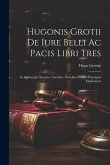"Cicero lays it down that in a well-ordered State the laws of war should be scrupulously observed. Alike in beginning a war and in carrying it on and in ending it, law has a most important position..." -Balthazar Ayala, De Jure Et Officiis Bellicis Et Disciplina Militari Libri III (1582) De Jure Et Officiis Bellicis Et Disciplina Militari Libri III, Volume II (1912) by Balthazar Ayala originally published in 1582 outlines basic doctrine for conducting war, most specifically that military forces cannot target civilians. This is a 1912 replica of the first edition which contains the English translation, Three Books on the Law of War and on the Duties Connected with War and on Military Discipline, by John Pawley Bate. With philosophical ideals that are relevant to any time period, this text is a great addition to the personal library of anyone interested in history and the foundation of military law. The original Latin text edited by John Westlake is available in Volume I from Cosimo Classics.
Hinweis: Dieser Artikel kann nur an eine deutsche Lieferadresse ausgeliefert werden.
Hinweis: Dieser Artikel kann nur an eine deutsche Lieferadresse ausgeliefert werden.








